Wednesday, December 28, 2016
Super Series '76 - 1975-76 Soviet Central Red Army Vladimir Petrov Jersey
A new era in NHL history began on this day in 1975, when the New York Rangers hosted HC CSKA Moscow, more popularly known as Central Red Army, the most dominant club in the history of the Soviet Championship League.
Prior to this point, the Soviet National Team had competed against the Team Canada in the Summit Series in 1972 and again in 1974 versus a team made of WHA All-Stars.
Wanting to further capitalize on the success of the Summit Series, and the capital to be gained from the mystery and curiosity surrounding the still exotic Soviets from behind the Iron Curtain, the Super Series '76 was scheduled. What set the Super Series '76 apart from the previous competitions was this was the first time that club teams from the Soviet Union would be facing teams from the NHL.
Goal magazine program cover for the 1976 Super Series
While some motivation for the series was certainly profit oriented, neither side wanted to be humbled or worse, humiliated, with the eyes of the hockey world upon them. Already armed with the Red Army club, the other team making the trip over to North America was the defending Soviet champions, Krylya Sovetov Moscow, better known to North Americans as the Soviet Wings, due to their position as the sporting club of the Soviet Air Force. To ensure the strongest clubs possible, the Red Army team was augmented with a pair of players from Dynamo Moscow and the Wings added four members of Spartak Moscow to enhance their roster.
Representing the NHL were the New York Rangers, Montreal Canadiens, Boston Bruins, Philadelphia Flyers, Pittsburgh Penguins, Buffalo Sabres, Chicago Black Hawks and New York Islanders. While the NHL participants were all located in the east, they also represented some of the strongest clubs in the NHL at the time, with the Flyers having won the Stanley Cup the previous season over the Sabres, while the Islanders and the Canadiens were semifinalists and all of the clubs had qualified for the playoffs in 1974-75.
Despite all the games taking place in the east, don't overlook the absence of both the Detroit Red Wings (58 points the previous season compared to the 113 totaled by the Flyers, Sabres and Canadiens) and the dreadful expansion Washington Capitals, who finished the previous season at 8-67-5 for 21 points, and whom the NHL was not going to let anywhere near the best of the Soviet Union. The Toronto Maple Leafs, on the other hand, were absent due to cantankerous owner Harold Ballard's refusal to allow Soviet teams to play in Maple Leaf Gardens!
The Super Series '76 first game was held on this date in 1975 when the Red Army club invaded Madison Square Garden to take on the Rangers, who were led by Rod Gilbert, Steve Vickers, Rick Middleton, Carol Vadnais and known patriot Phil Esposito, who would skate through a brick wall to uphold the honor of the NHL against the Soviets.
The Red Army club, meanwhile, was the de facto Soviet National Team, and was led by Vladimir Petrov, Boris Mikhailov, Valeri Kharlamov and goaltender Vladislav Tretiak.
Tretiak tending goal for Central Red Army
The Red Army prevailed on that night with a dominant 7-3 victory in front of 17,500 Rangers fans. Similar to the start of the 1972 Summit Series, the North Americans scored quickly, this time just 21 seconds into the game on a goal by Vickers. Unfazed, the goal did nothing more than wake the sleeping bear, and Red Army had the lead four minutes later and led 3-1 after the first. The Soviets kept piling it on until their lead had stretched to 7-1 at one point before the Rangers were able to put two meaningless goals by Tretiak to make the final 7-3, the exact same score of Game 1 of the first Summit Series. Petrov scored four points on 2 goals and 2 assists while Kharmalov had a goal and 3 assists to lead Red Army, who were outshot 41-29.
Carol Vadnais of the Rangers defends Valeri Kharlamov
A near equal result followed the next day when the Soviet Wings easily handled Pittsburgh 7-4.
The next game for the Red Army came in Montreal on New Year's Eve, the now legendary game between two of the finest clubs ever, both in mid-season form, as the eventual 1975 champion Canadiens, who were on the verge of a dynasty, skated to a 3-3 tie with the Soviets in what many call the greatest game ever played, as Tretiak held off the NHLers despite being outshot 38-13.
The three stars of the fabled New Year's Eve game, Peter Mahovlich, Tretiak and Yvan Cournoyer
Next up for the Wings was a trip to Buffalo on January 4, 1976, a night those in attendance will never forget, as the Sabres pounded the Wings 12-6, earning the distinction of becoming the first NHL club to ever defeat a Soviet club.
It would be the worst loss ever by a Soviet team in international competition. So popular was the Sabres win with NHL fans that they received a standing ovation before their next game - in Montreal!
Sabres general manager Punch Imlauch called the game "was the all-time high point for the Sabres"as well as the highlight of his lengthy career.
Such was the significance of the Sabres victory that a souvenir of a game is created following the contest
"I had never been so fired up for a game," said Rick Martin. "I had played in a lot of big games, but that truly was the game I'll never forget."
The Wings rebounded from their crushing defeat by Buffalo to down the Chicago Black Hawks three days later 4-2, while the Red Army stayed unbeaten with a 5-2 win in Boston on January 8th.
The Wings then concluded their North American foray with a 3-1 record after their 2-1 defeat of the New York Islanders, but the Red Army still had one battle awaiting them in the form of the Broad Street Bullies in Philadelphia.
Played on January 11th, the two-time defending champions were also eager to defend the honor of North American hockey - by any means necessary. Fired up by club owner Ed Snider, the Flyers were out to prove they were the best club hockey team on the planet.
The Flyers reputation preceded them, and the Soviets were already aware of the Bullies style, especially in the form of captain Bobby Clarke, whose previous encounter in the 1972 Summit Series with Kharlamov had resulted in a broken ankle for the Soviet legend at the hands of Clarke.
A cartoon in a Soviet newspaper depicting
the Flyers with clubs instead of sticks
The Flyers held the Soviets scoreless after one period, taking the body whenever possible to attempt to contain the Red Army's uptempo style. The game proved to be a contentious one, with many scrums and hard hits.
Dave Schultz welcomes the Soviets to the City of Brotherly Love
The most notable event of the night was when the Flyers Ed Van Impe returned to the ice following a penalty, demolished Kharlamov, who stayed on the ice for a minute. When no penalty was called, the coach of Red Army, Konstantin Loktev, pulled his club off the ice in protest. A shouting match ensued between Snider and the president of the Soviet Hockey Federation, with Snider threatening to withhold payment to the Soviets.
Eventually Red Army relented, and returned to the ice, with the Flyers now even more intent on winning, and doing it their way, more than ever. It would take Philadelphia 17 seconds to score on the ensuing power play which resulted from the delay of game penalty imposed on the Soviets for their 16 minutes off the ice. A second Flyers goal ended the first period 2-0.
With the Flyers shorthanded once again, they opted to press forward, with Joe Watson eventually scoring a shorthanded goal at 2:44 of the second. Flyers coach Fred Shero joked that Watson had set back Soviet hockey twenty years with his goal against Tretiak.
The Red Army scored at the halfway point of the game to make it 3-1 after two periods, but Philadelphia controlled the third period, including scoring a fourth goal at 4:01, eventually outshooting the Soviets 49-13 to the delight of the home fans.
The Red Army thus returned home with a 2-1-1 record, when combined with the Wings, had the Soviets taking the series 5-2-1.
Today's featured jersey is a 1975-76 Soviet Central Red Army Vladimir Petrov jersey as worn during the Super Series '76, the first meeting between club teams from the Soviet Union and the NHL.
This jersey, in it's brilliant red of communism and emblazoned with the red star and hammer and sickle, was a guaranteed attraction at the gate, as hockey fans came to see the mysterious, emotionless robots on ice who played the game in a manner unfamiliar to the NHL, weaving out of their lanes and circling back to maintain possession of the puck, rather than dump it deep in the zone and bang and fight hard to get it back.
We strongly believe that the blue nameplates with the player names on the back in English were added for the Super Series' North American fans due to the white shoulder yoke stripe being covered up and the differing shades of blue between the sweater and the nameplate material, and were likely removed once the Red Army returned home to resume it's Soviet league schedule.
While North Americans commonly read the crest as UCKA, the translation of the Cyrillic characters is CSKA (sounding like "Chess-KA" when pronounced by someone speaking Russian, as the first "U" character translates to the sound "TS"), which stands for Central Sports Club of the Army, as the team was part of the sporting arm of the Soviet Army in the same way the Soviet Wings were sponsored by the Soviet Air Force and Dynamo Moscow was sponsored by the KGB, the national security agency of the Soviet Union, similar to the CIA in the United States.
Petrov would play from 1965 to 1983 in the Soviet Championship League, scoring 435 goals and 839 points in 677 games. He would win six World Championship gold medals, be the leading scorer at four World Championships, a two time Soviet league Player of the Year and the league's leading scorer five times. Additionally, he would win two Olympic gold medals and one silver.
Bonus Jersey: Today's bonus jersey is a 1975-76 New York Rangers Brad Park jersey as worn in their 1975 game against HC CSKA Moscow to open Super Series '76 in what was the first ever game between Soviet and NHL club teams.
The Rangers wore a special patch to commemorate their 50th anniversary, only the second patch the Rangers had ever worn, and their first in 25 years. It would be another 16 seasons before the Rangers would wear another, that in honor of the NHL's 75th anniversary in 1991-92.
Extra Bonus Jersey: Today's extra bonus jersey is a 1975-76 Soviet Wings Alexander Yakushev jersey as worn by the Wings during the Super Series '76 when Yakushev was loaned by Spartak Moscow to the Wings for their series of games against the NHL.
The "KC" initials on the front translate to "KS", standing for Krilya Sovetov, which in turn translates to "Wings of the Soviet". The cresting is done in felt on the wool sweater, while the nameplate has twill letters in English on nylon, which was added for the North American TV audiences.
Today's video section begins with footage of the Rangers game against Red Army to kick off the Super Series '76 as Esposito gets the Rangers off to a deceptively quick start, as Central Red Army would score the next seven goals of the game!
The legendary New Year's Eve game between the Canadiens and Red Army is out next featured clip.
This next clip is from the Red Army's game versus the Boston Bruins, their third game of their brief tour of North America.
Finally, the contentious game between the Flyers and Red Army, which shows this was no exhibition game, as the intensity and tension were so thick you could cut them with a knife. Just listen to the announcers as the Soviets are leaving the ice in protest to know that this was more than a hockey game, it was our way of hockey, perhaps even life, against theirs.
Subscribe to:
Post Comments (Atom)

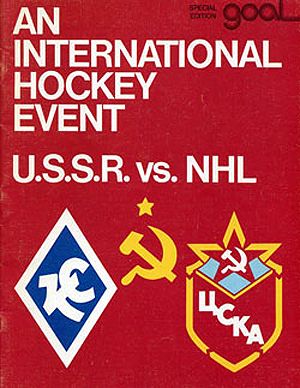
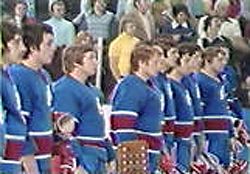
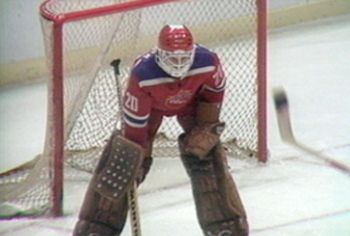
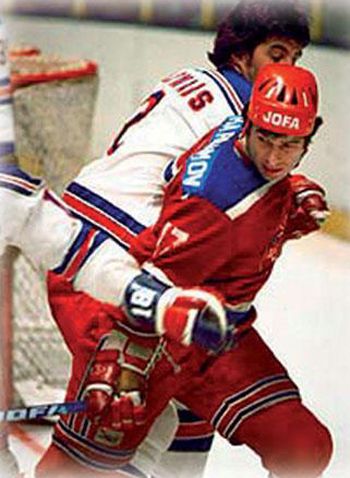
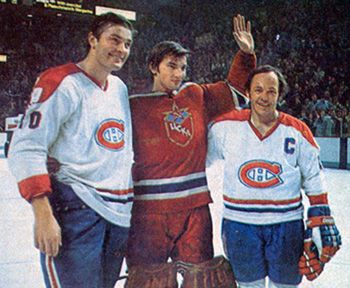
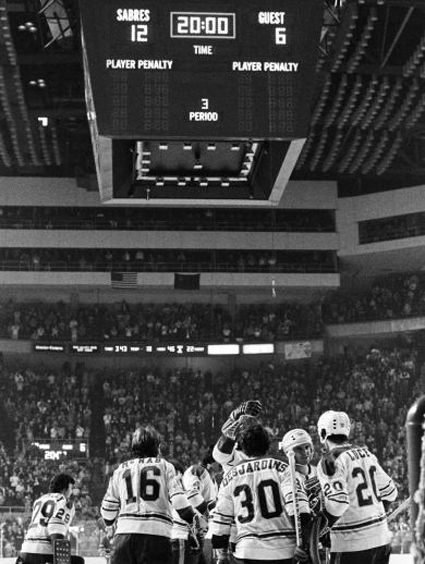
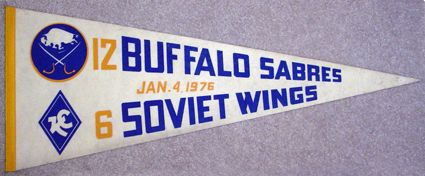
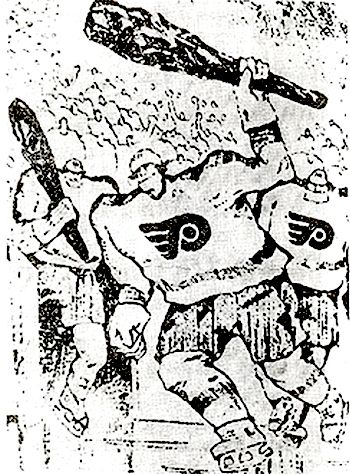
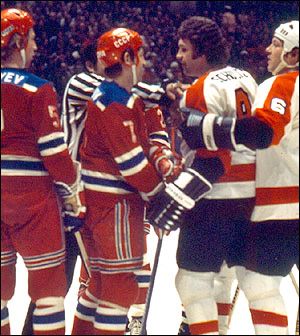
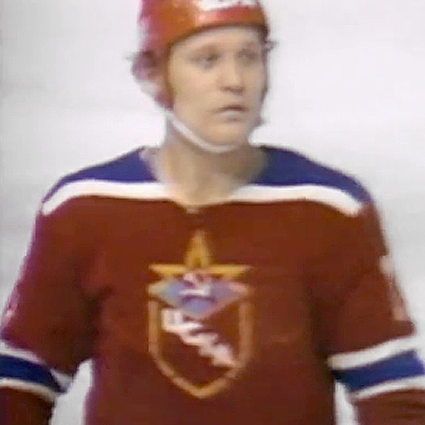
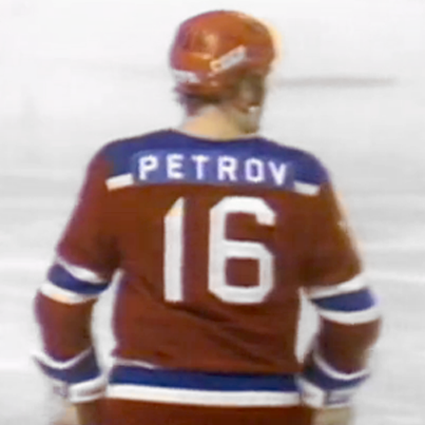
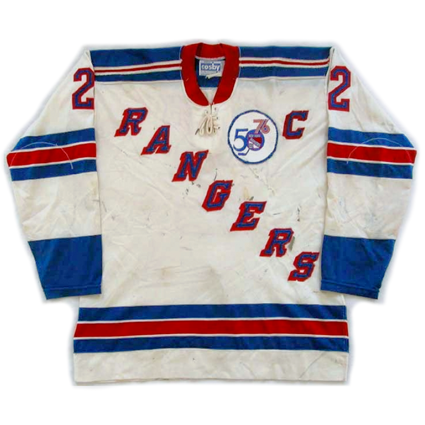
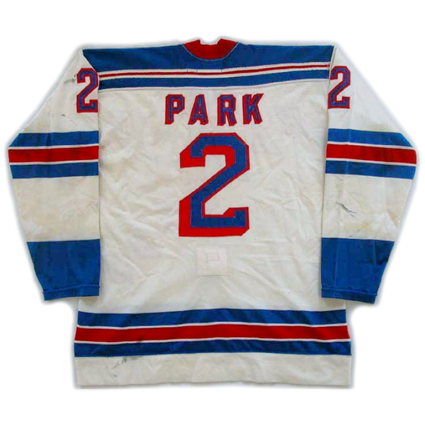
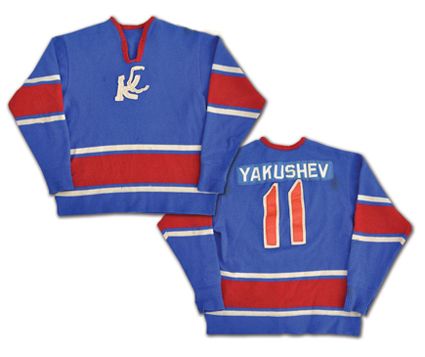










Awesome writeup. Will never forget King Kong Korab's hit among all those goals in the Sabres vs. S-Wings game.
ReplyDelete